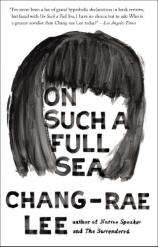On Such a Full Sea
Review
On Such a Full Sea
Imagine us. We are sitting on a dying earth, but our contentedness precludes us from acknowledging it. We work near tirelessly, day in and out, for the course of our lives to remain steady, static. We live communally, but barely speak with each other. Our own corner of the world is all we know and all we’re encouraged to understand. Save for the rarest cases --- fiery, untouchable brilliance, or the unexplained interest of a nebulous governing power --- we have no social mobility. And above all, we do not question our state of affairs, save in idle commentary. For what would be the use?
This is a glimpse of the world of Chang-rae Lee’s ON SUCH A FULL SEA, a novel set in a future dystopia that seems, at first, a great departure for him. Yet, although Lee here takes his first crack at speculative fiction, he still preoccupies himself with those themes that have served him so well for so long --- hope, will, betrayal, knowledge, regret --- in a setting reflecting our own, only eerily, near-apocalyptically stretched.
"Yes, the novel is gripping and compelling, the characters rich and scenarios memorable, but it is in the story’s telling --- literally in the way in which it is told --- that we find the writer’s true brilliance."
The novel’s narrator is a collective one: an ever-shifting group of unnamed inhabitants of a fishing labor settlement called B-Mor (once Baltimore), founded by emigrants from New China, who left to escape the pollution destroying their countryside. B-Mors are members of the second-tier of a rigid, three-tier class system that stretches worldwide. Although the dwellers of such settlements are lower than the powerful, ambitious residents of the wealthy Charter villages, they remain safer and better off than the denizens of the vastly numerous surrounding counties.
The B-Mors tell, reflectively, the story of Fan, a gifted 16-year-old fish-tank diver whose world is shattered instantly when her lover, Reg, disappears one afternoon without a trace. In reaction, what Fan does to B-Mor is simply unthinkable: unwilling to accept the illusions of safety in a society in which she has no say or control, she leaves.
Venturing off into the counties, she travels far and wide in search of Reg and discovers the chaos that reigns outside the walls of her home settlement. The counties are untamed and unshielded from an environment shattered by the failures of previous cultures and ignored by the governing bodies of the world --- here, the seemingly incurable C-illness that ravages the human genetic makeup is less easily managed. During her travels through the wild and eventually a Charter village, Fan runs constantly into danger, including a medical commune where, desperate for supplies, the residents use children as currency, and a family who hoards people as we keep pets.
Throughout the novel, Fan stares stolidly into the face of these terrors, and her character remains cryptically self-certain and driven, despite her drastic ordeals in what the narrating B-Mors call “this ever-dimming world.” Yet the narrators themselves make up for this, noting this mythic quality in Fan as they tell their own parallel tale of how they have begun to chafe at the confines of their predetermined, prepackaged lives in the B-Mor settlement. They see in Fan’s ostensibly rash decision to abandon her home the capacity for hope, for dreaming of something different --- an ability they, as a culture, have never been allowed to have.
And this is the great achievement of ON SUCH A FULL SEA. Yes, the novel is gripping and compelling, the characters rich and scenarios memorable, but it is in the story’s telling --- literally in the way in which it is told --- that we find the writer’s true brilliance. The relationship between B-Mor and Fan is symbiotic, even if neither is entirely able to grasp it, and on occasion it is difficult to determine whether Fan’s story is truly hers, or if the settlement’s tellers are simply conjecturing, unable to keep the possibility of her movement, ever onward, from their minds. In the end, it is hard to know. For as the B-Mors remind us, “a tale, like the universe, they tell us, expands ceaselessly each time you examine it, until there’s finally no telling exactly where it begins, or ends, or where it places you now.”
Reviewed by John Maher on January 9, 2014
On Such a Full Sea
- Publication Date: December 2, 2014
- Genres: Fiction
- Paperback: 432 pages
- Publisher: Riverhead Trade
- ISBN-10: 1594632898
- ISBN-13: 9781594632891





